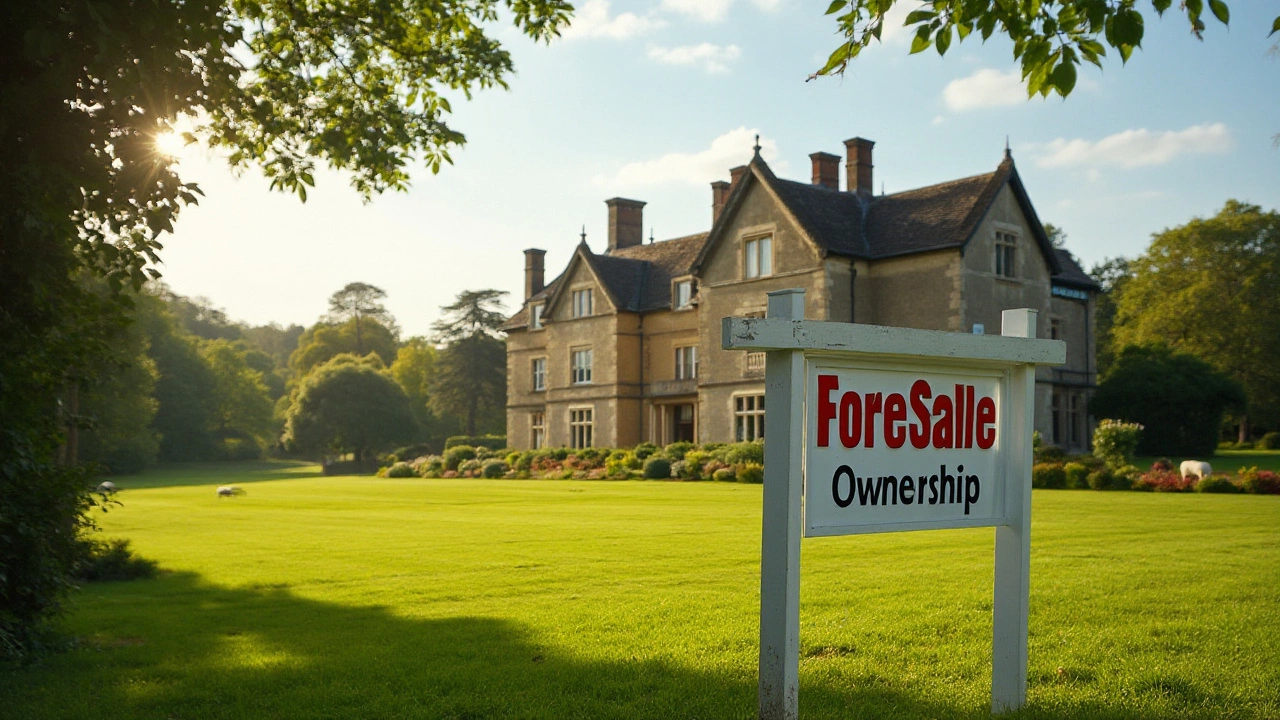Owning a piece of paradise sounds like a dream. Fractional ownership presents an intriguing option, allowing you to own shares of high-end properties without breaking the bank. Yet, just like any thrilling ride, it's not without its bumps. Before you dive in, it's crucial to weigh the potential pitfalls that might not be immediately obvious.
Diving into the world of fractional ownership requires some careful contemplation. At first glance, the arrangement offers a glittering allure: shared costs, coveted locations, and the prestige of owning a slice of luxury. However, beneath this glossy surface lie a range of complexities and potential downsides that prospective buyers should be wary of. Managing and sharing a home can become complicated, and unforeseen financial burdens often lurk in the shadows.
Legal issues might also surprise you, as buying a fraction of property entails more than just a simple real estate transaction. What's more, your personal use of the property is restricted to specific times, meaning it's not always available when you wish. As we dig deeper, these complexities reveal why fractional ownership should never be an impulsive decision but a well-considered commitment.
- Complex Management and Scheduling
- Financial Risks and Hidden Costs
- Legal Complications
- Limited Personalization and Use
Complex Management and Scheduling
Imagine sharing a prized possession—not just with friends or family, but with a group of strangers who also have access rights. That’s the cornerstone of fractional ownership, where the joys of shared costs come with the challenge of shared management. Coordinating with multiple owners makes managing the property akin to organizing a symphony with a diverse cast of musicians—all having different preferences and schedules. The reality is that orchestrating the usage schedule among owners can quickly become cumbersome, demanding a level of communication and cooperation that is often underestimated at the outset.
Typically, fractional ownership properties employ a rotational calendar system, ensuring each part-owner gets fair use of the location. This can sometimes lead to dissatisfaction especially during peak times such as holidays or during preferred seasons when demand naturally rises among share-holders. The key to navigating this is often found in addressing scheduling conflicts far in advance, requiring an impressive level of foresight into each member’s calendar. Larger ownership pools can exacerbate these issues, turning what was expected to be a fringe benefit into a source of frustration.
Moreover, the responsibility of maintenance is no small matter either. It's akin to managing a mini-homeowners association, where agreements on matters like replacing worn-out furniture or dealing with necessary repairs need consensus to move forward. Depending on how shared homes are managed, this can either become a smooth-running operation or a point of contention. It’s not just about who physically manages the property, but also how decisions affecting all stakeholders are made. Some properties employ professional management companies to facilitate this, but these add an extra layer of cost that not all owners may agree upon.
"Successful fractional ownership arrangements often rely on clear communication and robust agreements," explains real estate expert Louise Carr from Estate Analytics. "Without it, the dream of owning a share can rapidly become a headache."
Technology can lend a hand here, though, with modern apps and online platforms designed to streamline scheduling and maintenance discussions. Platforms that allow instant updates and notifications about available times, upcoming maintenance, or any urgent notices can mitigate some of these challenges. However, relying heavily on digital solutions also requires everyone's buy-in, adding yet another layer to the complexity. As more homes harness technology to aid in effective management, the learning curve for all involved can initially elevate rather than eliminate challenges.

Financial Risks and Hidden Costs
Venturing into fractional ownership might seem like a cost-effective way to enjoy a luxury property, but it's essential to look beyond the face value. The shared cost of owning a property with multiple parties initially promises financial relief; however, hidden expenses can quickly spiral if not carefully managed. These costs are often tucked away in the fine print and could start to resemble a never-ending game of hide-and-seek with your wallet. Ownership in shared properties brings an array of charges: management fees, unexpected maintenance costs, and occasional legal expenses. These financial obligations tend to be underestimated by many who are new to the concept.
Management fees, often underestimated, can escalate since they cover everything from routine upkeep to unexpected repairs. Let's not forget the sudden appearance of special assessments, large fees required for significant repairs or upgrades that can catch owners off guard. A new roof or an upgraded heating system may sound great until the bill slips under your doorstep. These aren't negligible and could alter your financial plans overnight. For those who've never managed real estate, these can be startling, causing tension among co-owners if some parties are unwilling or unable to contribute. It's crucial that all potential proprietors delve deep into the management structures that hold the property together before diving in.
Real estate investments are expected to pose some level of risk, but fractional ownership introduces complexities that might not exist in traditional property purchases. Financing options can sometimes be limited or expensive since not all financial institutions offer support for fractional ownership structures. Furthermore, the resale market for fractional ownerships can be sluggish, sometimes requiring deep price cuts or additional incentives to move a stake. According to a report by the National Association of Realtors, properties with unique ownership structures often linger longer on the market, making them less liquid investments. Liquidity concerns aren't for the faint-hearted, and selling your share might take longer and yield less than imagined.
Unexpected Costs in Legal Compliance
Legal fees are another iceberg beneath the waterline of shared homes. These properties often face complex agreements that lay out every owner's rights and responsibilities. While signing, you might be entranced by the prospect of summers spent in a coastal villa, but what happens when a dispute arises or regulations change? Legal intricacies could lead to costs for mediation or legal representation that were not part of your initial budget. Beyond disputes, fractional ownership may also entail adhering to regulations specific to shared ownership. Changes in laws or policies can translate into substantial costs for compliance, requiring input from specialized legal advisors. Hence, staying informed and prepared for regulatory changes is indispensable.
For those who wish to delve even deeper, taking counsel from experts in real estate law isn't just recommended—it's necessary. They can parse through documents and offer clarity where the language is most dense. For this reason, becoming a fractional owner should not be a decision taken lightly, especially when assessing the unseen yet certainly felt financial risks. As appealing as it may be to own a part of a dream, without due diligence, that dream might turn into a financial nightmare.

Legal Complications
Embracing fractional ownership might initially seem straightforward, much like buying any slice of property. But dive deeper, and you'll find that it's a legal labyrinth. Unlike sole ownership, fractional property comes with a set of rules and regulations that can tie even the most savvy buyers into knots. The very concept hinges on shared responsibility and access among multiple owners. This arrangement necessitates detailed legal agreements specifying everything from use schedules to maintenance obligations. Many potential pitfalls lurk within these agreements, often riddled with jargon and clauses that can be open to interpretation. The complexity of these contracts means it's wise to engage a legal professional who can parse through the documents, ensuring you're aware and protected against future disputes.
Another substantial legal issue arises from the nature of co-ownership itself. With multiple parties owning a share, each owner has to have a clear understanding of their rights and responsibilities. One key complication is decision-making power. Who gets to decide if the roof needs fixing, or if the property should be sold? Usually, a governance structure is put in place, often with votes proportionate to ownership shares. However, disputes can and do occur, particularly if owners hold differing visions for the property. This can devolve into lengthy and costly legal battles, eroding not just the financial benefit but also your enjoyment and use of the property.
Taxation is another legal minefield waiting to be navigated in shared homes. Differences in tax laws depending on the jurisdiction where the property is located and the residency of the fractional owners can lead to unexpected tax liabilities. Each piece of the puzzle—from inheritance implications to foreign investment regulations—requires meticulous examination. Property taxes, income taxes on rental, and capital gains tax apply differently in fractional ownership scenarios compared to full ownership. It's paramount to consult a tax advisor well-versed in real estate to understand any impending tax burdens you may face. A misstep in this area can lead to hefty fines and legal troubles, cutting deep into any financial advantage fractional ownership might offer.
For many, the overarching concern is the lack of legal recourse in certain jurisdictions should an internal dispute arise. In some cases, owners might find themselves without the legal leverage they assumed they had, given convoluted local property laws. As noted by real estate legal expert John Smith,
"In fractional ownership, your rights are often only as strong as the weakest link in your agreement. One poorly written clause can compromise your entire investment."Such insights underscore the necessity of scrutinizing each legal document involved.
Elements such as exit strategies are critical too, and yet, they're often the least discussed component of fractional ownership agreements. Deciding how to divest can be as contentious and complex as the purchase itself. Circumstances change—jobs, financial situations, personal goals. Without a clear, legally binding exit plan, owners can find themselves at the mercy of market conditions or fellow owners’ whims. An effective strategy often includes outlined conditions under which owners can sell their shares, either back to the group or to external parties, and this needs to be spelled out in the initial agreement.

Limited Personalization and Use
When it comes to fractional ownership, one of the key downsides that potential buyers often overlook is the restricted ability to personalize and use the property freely. Unlike owning a home outright, fractional ownership often means that the property is shared with several other owners. This limits how much you can truly make the space your own. Owners are usually unable to undertake significant remodelings, such as painting walls with their favorite hues or installing custom fixtures to suit their lifestyle preferences. The decisions regarding alterations or major repairs often require consensus among all owners, which can be difficult to achieve. Having a fixed structure for property usage, dictated by a predetermined timetable, means that spontaneous visits or holidays during peak seasons may not be feasible. This can be disheartening, especially when you find the property's schedule doesn't align with your plans or lifestyle.
Many find that they must plan their vacations or staycations around availability rather than preference, resulting in a less flexible lifestyle. Scheduling can become a bit of a juggling act, and if you happen to have conflicting dates with fellow owners, disappointment is almost inevitable. Various owners having their own vision for the space can create a tricky scenario for personalization, often leading to bland compromises instead of spaces that feel truly unique to anyone involved. In terms of enjoyment, this might feel more like renting rather than owning your slice of paradise.
The uniqueness of shared homes lies in balancing between personal desires and group decisions. As Dan Lark from the Real Estate Council points out, "While shared ownership reduces costs, it also requires accepting a space that's shaped more by committee than by personal touch." This quote underscores the essence of such properties: living and sharing with others' preferences in mind. Additionally, real estate investment in this form often comes with usage restrictions, limiting the personal time you can spend within your legally owned piece of land. Potential users must weigh whether the reduced costs outweigh the inability to personalize and to use the property at will.
